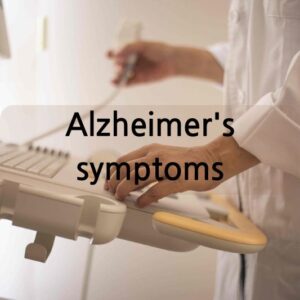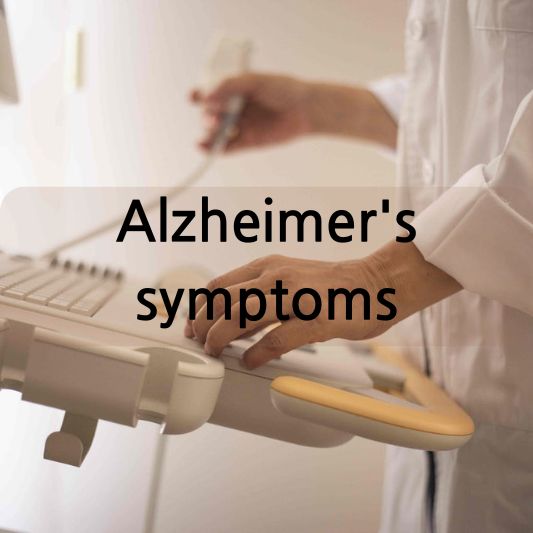Alzheimer’s disease, a progressive neurodegenerative disorder, poses significant challenges for individuals, families, and societies worldwide. As we delve deeper into the complexities of Alzheimer’s, understanding its causes, symptoms, diagnosis, and care strategies becomes paramount.

Introduction to Alzheimer’s Disease
Alzheimer’s disease, named after Dr. Alois Alzheimer who first described it in 1906, is the most common form of dementia. It primarily affects memory, thinking skills, and behavior, gradually impairing an individual’s ability to perform daily tasks and engage in meaningful interactions.
Understanding Alzheimer’s: Causes and Risk Factors
Genetic Factors:
While the exact cause of Alzheimer’s remains elusive, genetic predispositions play a significant role. Individuals with a family history of Alzheimer’s are at higher risk of developing the disease.
Age-related Risk:
Advancing age is the most significant risk factor for Alzheimer’s. As individuals grow older, their likelihood of developing the disease increases exponentially.
Lifestyle Factors:
Certain lifestyle choices, such as poor diet, lack of physical activity, smoking, and limited cognitive stimulation, may contribute to the development of Alzheimer’s.
Symptoms and Progression of Alzheimer’s
Early Signs and Symptoms:
Early symptoms of Alzheimer’s may include memory loss, confusion, difficulty in problem-solving, and challenges with language.
Stages of Alzheimer’s Progression:
Alzheimer’s typically progresses through mild, moderate, and severe stages, with symptoms worsening over time and eventually leading to complete dependence on others for care.
Diagnosis and Treatment Options
Diagnostic Procedures:
Diagnosing Alzheimer’s involves a comprehensive assessment of medical history, cognitive tests, imaging studies, and laboratory evaluations.
Available Treatments and Management Strategies:
While there is no cure for Alzheimer’s, medications and non-pharmacological interventions can help manage symptoms and improve quality of life.
Caring for Individuals with Alzheimer’s
Tips for Caregivers:
Caregivers play a crucial role in supporting individuals with Alzheimer’s, offering patience, empathy, and a safe environment conducive to their well-being.
Support Systems and Resources:
Various support groups, community organizations, and professional services provide invaluable assistance and respite for caregivers.
Research and Future Perspectives
Ongoing Research Initiatives:
Researchers worldwide are actively exploring new treatments, diagnostic tools, and preventive strategies for Alzheimer’s.
Potential Breakthroughs and Advancements:
Emerging therapies, including immunotherapies and gene therapies, hold promise in altering the course of Alzheimer’s progression.
Alzheimer’s and Mental Health
Impact on Mental Health:
Alzheimer’s not only affects cognitive functions but also takes a toll on emotional well-being, leading to anxiety, depression, and social isolation.
Coping Mechanisms and Support:
Effective coping mechanisms, such as mindfulness practices, support groups, and counseling, can help individuals and families navigate the challenges of Alzheimer’s.
Preventive Measures and Lifestyle Changes
Importance of Brain-healthy Habits:
Adopting a brain-healthy lifestyle, including regular exercise, balanced nutrition, social engagement, and cognitive stimulation, may reduce the risk of Alzheimer’s.
Risk Reduction Strategies:
Managing chronic conditions like hypertension, diabetes, and obesity, along with avoiding excessive alcohol consumption and smoking, can mitigate the risk of developing Alzheimer’s.
Community Awareness and Advocacy
Importance of Raising Awareness:
Increasing public awareness about Alzheimer’s fosters understanding, compassion, and support for affected individuals and their families.
Advocacy Efforts and Initiatives:
Advocacy organizations play a pivotal role in promoting research funding, policy reforms, and improved access to care for individuals with Alzheimer’s.
Alzheimer’s and Family Dynamics
Family Support and Communication:
Open communication, mutual support, and shared decision-making are essential in navigating the complexities of Alzheimer’s within families.
Challenges and Coping Strategies:
Family caregivers often face challenges balancing caregiving responsibilities with personal and professional commitments. Seeking external support and practicing self-care are vital for resilience.
Understanding Dementia vs. Alzheimer’s
Distinguishing Between Dementia and Alzheimer’s:
While Alzheimer’s is the most common form of dementia, there are other types, such as vascular dementia and Lewy body dementia, each with distinct characteristics and progression patterns.
Types of Dementia and Their Characteristics:
Different forms of dementia present varying symptoms, prognosis, and treatment approaches, necessitating accurate diagnosis and tailored management strategies.
Global Impact of Alzheimer’s
Economic Burden:
Alzheimer’s exerts a significant economic burden on healthcare systems and societies, requiring substantial investments in research, care, and support services.
Social Implications:
The social impact of Alzheimer’s extends beyond the individual, affecting families, caregivers, workplaces, and communities, highlighting the urgent need for collective action.
Innovations in Alzheimer’s Care
Technology Advancements:
Technological innovations, including wearable devices, smart home technologies, and telemedicine platforms, offer novel solutions for monitoring, managing, and enhancing the quality of life for individuals with Alzheimer’s.
Innovative Approaches to Care:
Person-centered care models, interdisciplinary collaborations, and holistic interventions emphasize individual preferences, dignity, and autonomy in Alzheimer’s care.
Addressing Myths and Misconceptions
Common Myths About Alzheimer’s:
Dispelling misconceptions surrounding Alzheimer’s, such as the belief that memory loss is a normal part of aging, fosters greater understanding and empathy towards affected individuals.
Dispelling Misconceptions:
Educating the public about the realities of Alzheimer’s, including its progressive nature and the importance of early diagnosis and intervention, reduces stigma and promotes early access to support services.
Conclusion
Alzheimer’s disease poses multifaceted challenges that require a comprehensive approach encompassing research, care, advocacy, and community engagement. By fostering greater awareness, advancing research, and enhancing support systems, we can empower individuals with Alzheimer’s and their families to navigate this journey with dignity, compassion, and resilience.
FAQs: Frequently Asked Questions
What are the early signs of Alzheimer’s disease?
Early signs of Alzheimer’s may include memory loss that disrupts daily life, challenges in planning or solving problems, difficulty completing familiar tasks, confusion with time or place, trouble understanding visual images and spatial relationships, new problems with words in speaking or writing, misplacing things and losing the ability to retrace steps, decreased or poor judgment, and withdrawal from work or social activities.
Is Alzheimer’s disease hereditary?
While genetics can play a role in Alzheimer’s disease, it’s not solely determined by heredity. Having a family history of the disease can increase your risk, but many other factors, including lifestyle and environmental influences, also contribute to its development.
How is Alzheimer’s disease diagnosed?
Alzheimer’s disease is typically diagnosed through a comprehensive evaluation that includes medical history assessment, physical and neurological exams, cognitive tests, and imaging studies such as MRI or CT scans. In some cases, doctors may also perform blood tests to rule out other possible causes of symptoms.
Are there any effective treatments for Alzheimer’s?
While there is currently no cure for Alzheimer’s disease, there are medications available that can help manage symptoms and improve quality of life for some individuals. These include cholinesterase inhibitors and memantine, which may temporarily improve cognitive function and slow down the progression of symptoms in some people.
What can I do to support a loved one with Alzheimer’s disease?
Supporting a loved one with Alzheimer’s involves providing emotional support, maintaining open communication, and ensuring safety and comfort. Educating yourself about the disease, seeking support from caregiver groups, and accessing available resources and services can also help in providing effective care and support.
